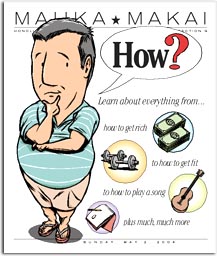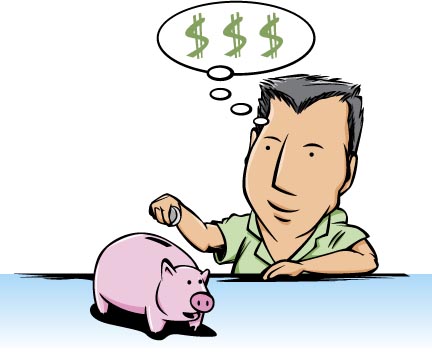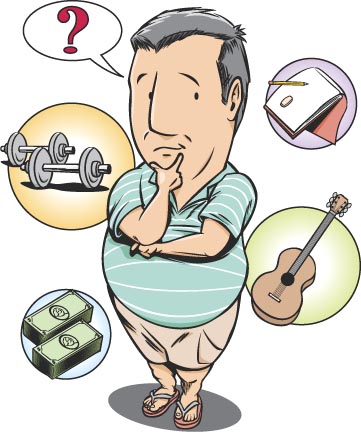
[ MAUKA MAKAI ]
Have lots of money
Next Chinese new year I have to stay away from the cheem, those fortune-telling sticks that are all too truthful. Face it, we go to astrologers, psychics and tarot readers because we hope they'll tell us something really good is coming our way, if only we can be patient for a little while longer. So the truth can be depressing.
Four years ago, the oracle at the Kuan-Yin temple predicted bad luck for me with the number 99. "No, it's 66," I told the reader.
She insisted a thin line drawn under the number indicated it was, indeed, 99. It was, indeed, a very bad year.
This year, the cheem stick foretold, "You will be very successful ..."
My ears perked up at the reader's cheery, assuring voice. "... if you work very hard," she continued.
Gee, thanks. I really don't need a fortune teller to state the obvious. Similarly, we don't need anyone to tell us how to get rich. As far as I have been able to glean from half a lifetime of hard work, there are only four paths to wealth:
1. You're born with it. Look at your surroundings. It should be obvious that life is good if your parents are Bill and Melinda Gates or Madonna.Experts agree that the path to wealth means first acknowledging the desire to have money, which for many is still looked upon as an evil, taboo subject. So rule No. 1 is, get over it. There's no shame in having money. Mark Inouye, a financial consultant with A.G. Edwards, said he recognized the value of cash in his pre-teens. "You can do things if you have money, whether it is to travel or help people. It doesn't mean you have to drive a Rolls or have the biggest house on the hill."2. You are renowned for exceptional talent and/or beauty. Walk out your door. Are people falling at your feet or screaming your name? People are willing to pay a lot to own a piece of the stars.
3. You're lucky. Your daughter's name is Jennifer Lopez and she gives you an allowance as well as buying anything you could want or need. You use your allowance to put $3 into the slots in Atlantic City and you win $2.4 million. This is your life Guadalupe Lopez! You hit the jackpot twice, having also won the genetic lottery in reverse. The rest of us would be happy with one jackpot.
4. You work for it day in and day out. You continue to do this to age 67 and beyond, while saving and investing your way to a comfortable, if not particularly lavish retirement. At least you won't be among the expected legion of working 70-year-olds. In other words, pay now or pay later. Most of us fit this category. What to do, what to do ...
Rather than making money, he said, most people are more afraid to lose it.
On the other hand, there are the very young, who stand most to gain from investing over time, who find the subject tiresome. Inouye said, "The idea of saving your money and investing is a hard message to follow because it's not very exciting.
"Young people think they'll have an eternal cash machine. A lot of them live with their parents so they're paying low or no rent, all their meals are provided, so they have lots of money to go out and party. It's an unrealistic world," he said. It may feel rewarding in the short-term, but offers no payoff over the long haul.
Here then, we offer two sets of advice. One is geared toward those who want to stay out of the poor house. The other is for those aiming to join the ranks of the Warren Buffets and Ted Turners of the world.
BACK TO TOP |
How to stay out of the poor house
1. Learn the basics. As you would when learning any skill, read up on the subject of saving and investing. Tons of books are available, and magazines such as Money and Smart Money are user-friendly, written for newbies.
2. Get good advice. After you've gleaned the basics, you're ready to speak to financial planners and consultants. Knowing investment terms ahead of time prepares you to ask questions without your eyes glazing over at the answers. Understand what opening an account with a particular investment company entails. Check the company's credentials and policies. You will want to understand enough to maintain control over your account, avoiding brokers who would churn it, or buy and sell frequently, thus racking up commissions for themselves.
3. Get started. That means saving enough to open an investment account, though it's hard to convince people to jump into the market. "They think the system is rigged and that they're going to fail," said financial consultant Mark Inouye. "The problem is stock is an intangible asset. They don't see it. They don't collect rent from it. Most people want to be led by the hand rather than make their own decisions, but we try to educate them so they know what they're buying." The upside can be greater than bank savings accounts paying low interest, although interest rates are creeping up.
4. Have a plan. You can't get anywhere without knowing where you are and where you want to be. Start by calculating your net worth, simply, your assets minus your liabilities. Know where you want to go and enlist the help of those who can advise you how to get there. If you're in your 20s, lucky you; you have a lifetime of earning power that can be maximized by investing.
5. Diversify. Don't put all your dollars in one basket, as those in the stock market learned when it crashed in December 2002. It would have helped to have some of your funds in real estate.
6. Open a Roth IRA. Today. A 25-year-old who contributes the maximum to a Roth will amass a sizeable nest egg. A Roth allows income to accumulate tax free, with tax-free withdrawals at retirement.
7. Get married. Two incomes are better one. Just be sure you and your spouse are on the same financial wavelength. Fewer disagreements over money increases your odds of staying together. Divorce can be costly.
8. Invest in real estate. You could live in it, but even better, rent it out while you live cheaper with the 'rents until you're 40, or for as long as they'll put up with you. Before you know it, you'll be on your way to being a mini mogul.
9. Take care of your health. Medical expenses can put you in the poor house quicker than you could after several shopping sprees.
10. Don't be a show-off. You don't really need a new car. Financial consultant Inouye says he's never owned a new car. You don't need the latest designer duds either. If you must have designer pieces, prioritize, shop sales, and use your highly refined sense of aesthetics to blend in thrift-shop finds. The showy stuff can wait 'til after you've earned your first mil.
BACK TO TOP |
How to be rich
The aforementioned advice is practical and "probably the best for the most people" according to Robert Kiyosaki, but it isn't for him.
The author of "Rich Dad, Poor Dad" and most recently, "Rich Dad's Who Took My Money?: Why Slow Investors Lose and Fast Money Wins (Warner Business Books), says bluntly by phone from his home in Arizona, "I don't save. There are ways of making money faster.
"The idea of getting rich by saving money is obsolete in economic terms. Saving is not bad advice for the average person. But if you have a job and you're just saving, for every $2 you earn you're really only making $1 after taxes and inflation, so it's really hard to get ahead.
"You have to find a way to make a lot of money fast, and a strange way of doing that is by borrowing money. Borrowing gets you ahead faster than saving."
His first investment was putting $18,000 into a Maui property, but he got out of the Hawaii market 20 years ago, in favor of real estate in Texas, Arizona and Nevada. Arizona provides a central location for running his Rich Dad book and seminar empire, which has him traveling across the country.
"Most people can borrow money, but they borrow it for junk -- cars, clothes -- they turn cash to trash. You have to borrow for value -- real estate, apartment buildings."
Kiyosaki, who grew up in Hawaii, became intrigued with money and wealth as a youth, when his "poor dad" lost his job and couldn't find work. At the time, he lost faith in the notion of job security.
"The richest people on earth, like Bill Gates, Michael Dell, start companies, or they're movie or sports stars. I wasn't a great athlete so I had to figure out what would be my best chance."
He gives the following scenarios to demonstrate the difference between saving and borrowing, when investing $20,000 over seven years:
» Saving in a bank paying 1 percent interest will net you about $21,000.Of course, there are risks involved in borrowing, and it is not for the meek, and involves careful analysis of cash flow.» Saving in a CD paying 5 percent interest will net you about $28,000.
» Using the money as a downpayment for a $200,000 home (a $180,000 loan) will net about $101,420 if selling after seven years, assuming no change in property value.
Many would caution that the real estate market is too high now to be lucrative, but Kiyosaki says, "People always have said that. People who aren't rich don't go looking for opportunities and basically, what you have to know is how to recognize a good deal from a bad one, and know when markets come up and down. The mathematics involved is very simple; it's high school math.
"People say they have a hard time finding a good deal. Those who say they can't, really can't do it, and that's strange to me. I find good deals all the time. I was recently in Hawaii and I saw a lot of condos available in Waikiki for under $100,000, but those won't help me. The more money you make, the bigger deals you need."
On the cover: This week's "How-to" guide will enlighten readers about health, wealth, music and literature.
ILLUSTRATION BY KIP AOKI
ABOUT TODAY'S PACKAGE
Magazine fronts are full of cover lines promising the same things every month. You'd think all we care about is how to be rich, thin, unstressed and beautiful.
This week, we attempt to answer life's most perplexing questions, which will free us to pursue more serious thoughts.
Here comes the disclaimer: We do not promise that any of the methods and practices contained within this issue will work universally. They are guidelines. As always, when seeking answers and advice, consult experts who can analyze your particular situation and come up with a custom solution.
ILLUSTRATIONS BY KIP AOKI
Click for online
calendars and events.



